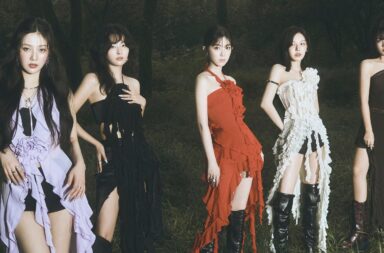 It could be argued that any K-pop act’s success is crafted behind the scenes by any company’s top team of composers, choreographers and concept creators. After all, what good is talent and skill without any real sense of artistic direction to channel it to?
It could be argued that any K-pop act’s success is crafted behind the scenes by any company’s top team of composers, choreographers and concept creators. After all, what good is talent and skill without any real sense of artistic direction to channel it to?
Measured by success brought to groups who have used his songs before, it is very hard to beat solo singer turned SM Entertainment in-house composer Yoo Young-jin, whose string of hits have started since the H.O.T days and have continued till today. Although recently, given SM’s increased collaborations with Western composers (SNSD TTS’s “Twinkle,” SHINee’s “Sherlock” and f(x)’s “Electric Shock” to name a few), Yoo has largely served more as a lyricist, providing lyrics to some of SNSD’s bigger hits, like “Genie.”
Still, it is hard to deny the impact he has had on the SM house sound, and with that it’s worth recapping his career over the years, as well as how the SM sound was made.
Yoo first made his debut as a singer, known more for ballads (a trait that would reflect more in his gentler compositions). However, his solo career was not very remarkable, with only one solo album to his name, in 1995. Below is one of the more known songs off his first release, “The Scent of You” (also known as “Your Perfume”).
Despite its relative obscurity when first launched, the song has now gained some measure of recognition, with artistes as varied as Kim Bum Soo doing a cover on I’m a Singer recently. A revised version was also performed by SM labelmates SES in 1997.
Yoo first began working on songs for what was then SM’s largest boy group, H.O.T. For their debut album, We Hate All Kinds of Violence, he contributed a third of the songs in the album. Here is one of the promotional singles, “Warrior’s Descendant,” which was a combination of most of the prevailing trends in Korean music then, complete with the baggy clothing so beloved of pop acts at that time.
Eventually, Yoo would become associated with some of H.O.T’s biggest hits, like “We Are The Future” and “I-yah.” The pattern of Yoo producing most of the lead or hit singles continued on to most of the SM lead groups, whether male or female, or from new debuts to established acts, such that over the years he has managed to leave an imprint on SM acts. In fact, some of his most iconic songs have become staples to be performed by successive generations of SM artistes, as shown below.
There are certainly some trademarks of the Yoo Young Jin sound. Firstly, there is always the use of a cleverly placed hook to ensure the song would stick with the listeners’. A good example would have to be that bassy punch heard in Super Junior’s “Sorry Sorry”, or in EXO’s “History”. Most listeners tend to react to punchy kicks in songs, and Yoo does know where to place them for maximum attention (and making the songs stick with the listener).
Another thing that Yoo does very well in is the formula which he uses to create his sounds. Lyrics that range from touching on the simple (temptation and falling in love with a stranger are common themes) to exploring problems with the world (EXO’s “Mama” is a pretty good modern example). That English words that blend in nicely with the rhythms and serve as nice sing-alongs for international fans certainly help with the songs sticking. Never mind that the English are at times self created words, designed to prioritise song flow over lyrical meaning, as he admitted in an interview.
Finally, there is something about Yoo that makes him very hard to peg down style wise, as well as keep him in business for such a long period of time, due to him being able to keep up with trends. How many composers could go that seamlessly from fun and whimsical songs such as Shinhwa’s “Eusha Eusha,” to mellow pop tunes like S.E.S’s “Twilight Zone,” to the hard charging epics like TVXQ’s “Rising Sun”? And also successfully keeping with SM’s trends toward a harder-edged electronic sound, like with SHINee’s “Ring Ding Dong” and “Lucifer.” In fact, in his interview, he also openly acknowledged constantly pushing the boundaries by experimenting with possible sounds.
Of course, one cannot forget the ballads. Despite how obvious his sonic signatures are (the smooth crooning, the slow build-ups), there is always something so pleasant about his slow-mid tempo compositions. Coupled with the better, singing sides of the SM talent pool, and it’s no wonder why these songs send fans into puddles of spazz (or at least admiration).
Despite the aforementioned praises, Yoo Young-jin is not exactly the perfect composer. For one, there is his habit about falling into a pattern after a while. While there is nothing wrong with trying to recreate a hit, there is a problem with trying to use exactly the same sound to do it, and that was something he tried to do with Super Junior. The result was a fair amount of criticism that Super Junior had become trapped by their “Sorry, Sorry” success, and could no longer work outside that.
This also applies to some of his more formulaic compositions like his ballads. While there are those who really love them, there are just as many who also feel that once they have heard one composition involving those creamy vocals mixed with some belting and an R&B driven groove, they have heard most of them.
And finally, there are those lyrics. While most of the time pop does not exactly call for the most profound lyrics, there are times one wishes were not so blatantly packed with Kongrish (“Mr. Simple”), or lines that do not work in English (“Lucifer”), or not so obviously written from a male perspective (“Genie”). This might be something that is an issue in most of K-pop, but given how most JYP acts have managed lyrics with perfectly workable English, it’s something that definitely could change.
In fact by combining most of his shortcomings in one song, the result is a rather formulaic and self-indulgent piece on what is currently SM’s biggest girl group (and yes he composed the whole thing)
Despite some grumbles, Yoo Young-jin is definitely still someone to be respected in the K-pop scene as a reliable hit-maker, for creating the sounds that have defined SM acts, as well as adapting to the changes in the K-pop sound over the years.
So Seoulmates, what are your takes on the SM in-house hit-maker?
(pbo3536, zinghardee, adorabledyan, 10 Asia [1] [2] [3], sment)


